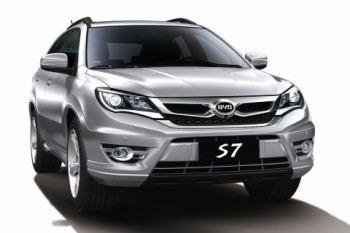Apr 29 2013
This week, BYD unveiled several exciting technologies to improve fuel efficiencies by greater than 20% in all their 2014 vehicle line-up. They are calling it the “Green Hybrid” initiative with “Insta-Pure” cabin filtering systems and were well aligned with this year’s Auto Show theme – "innovation, better life".
 S6 Premier (Photo: Business Wire)
S6 Premier (Photo: Business Wire)
There are several breakthroughs tied to the “Green Hybrid” initiative; first BYD becomes the first vehicle OEM to implement the higher-efficiency 48VDC vehicle voltage platforms using BYD’s internally developed Iron-Phosphate batteries (versus older heavy-metal-laden, 12VDC Lead-Acid technologies). This new technology allows the battery life to be extended to the expected life of the car – no more worrisome starter-battery replacements. Vehicles transition to all-LED lighting, Electronic Parking Systems, Hybrid and regenerative braking, idle start-stop energy management, automatic engine starts, low rolling resistance and advanced aero-dynamic designs. 48VDC systems are not hindered by the line/harness power losses experienced with normal lower-voltage systems (saving important energy for batteries). BYD then implemented low-voltage, large-torque, double-winding motor technologies for battery-acceleration-assist and regenerative braking. These changes have been shown to save as much as 1.5 litres of fuel/ 100km (on a 30 mpg car, that’s as much as a 7 mpg improvement!).
BYD’s “Insta-Pure” cabin filtering technology help protect drivers and passengers from dangerous city PM2.5 issues (Particulate Matter up to 2.5 micrometers in size), by quickly rotating cabin air, scrubbing and filtering it, all in less than 3-5 minutes. The first production vehicles launching with this advanced cabin purification system are the new BYD S6 Premier models –debuting at this year’s show. This level-4 purification technology is integrated into the vehicle’s air conditioning system and detects the inside and outside particulate matter levels, triggering auto-air-filtering equipment, sterilizing, deodorizing and purifying all PM2.5 levels to below 12. This technology not only gives consumer families a cleaner driving sphere, but also provides a feasible scheme for improving all urban environments.
While the “Suri” (featuring the break-through “Remote Driving Controller” technology) was announced at the 2012 Beijing International Auto Show, it was also on display again in Shanghai and has been selling an average of 10,000 units per month in the China market, exceeding BYD’s expectations. The second model debuting last year in the 2012 auto show was the advanced BYD Dual Mode “Qin” (pronounced “Chin”). Two models of Qin were on display at the Auto show though Qin officially launches in mass-production later this year in China. Qin is the next-generation dual-mode electric vehicle “flagship” using BYD’s innovative Dual Mode II system. The Qin can travel 50 km (31 miles) on a single 10 KWh charge and in hybrid mode output 223 KW of power and a whopping 440 Nm of torque -- accelerating from zero to 100 km/h (62 mph) in only 5.9 seconds (this was previously advertised as 6.9 sec, but BYD has improved it over the last year). Qin also has a top speed of 185 km/h (115mph). In hybrid mode, the Qin requires just 16 RMB (~$2.50 USD) of energy per 100 Km (equating to a little less than 2 liters of fuel per 100 km or 118 mpg).